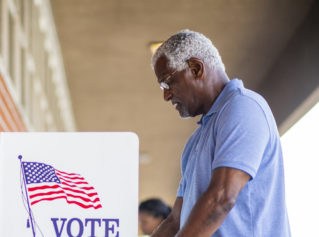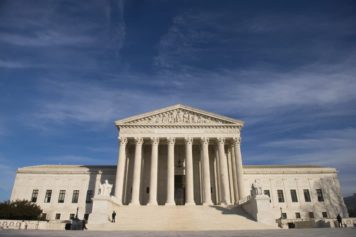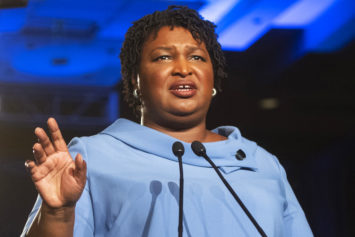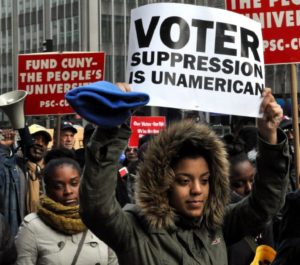
Voter ID laws have been ruled as unconstitutional infringements on minority voting rights in several states.(Source: Flickr)
This week, the U.S. Supreme Court heard the case of Gill v. Whitford, a political gerrymandering case in Wisconsin, in which Republicans rewrote the state’s district lines, Democrats are contending, for partisan and unconstitutional purposes. The court’s decision has the potential to change politics across the United States. Gerrymandering is a means of stacking the political deck, of drawing and carving an electoral map in such a way as to preserve incumbents, and give one political party an unfair advantage. Neither party is immune to the practice, but Republicans have maximized its use throughout the country, allowing the GOP to win state and federal races and control legislatures and state houses, even with fewer votes and less support.
In the case of Wisconsin, Republicans used sophisticated computer models to redraw legislative districts by ”packing” as many Democrats into a small number of districts as possible, and “cracking” the remaining Democratic voters by splitting them into various other districts such that they would never constitute a majority. In the 2012 elections, after rigging the map, Wisconsin Republicans won only 48.6 percent of the vote statewide, yet captured 60 of 99 seats in the state assembly. Nationally, Republicans won 53 percent of the vote, but 72 percent of Congressional seats where they redrew the map.
If gerrymandering is one reason why Americans can’t have nice things, the Supreme Court case comes at a crossroads for voting rights and political participation. One question that arises is how to expand voter participation for those left out of the political process, and guarantee fair and equitable representation for everyone. For the Black electorate and other disenfranchised voters, there is much on the line, with an assault on voting rights on the state and federal level following the evisceration of the Voting Rights Act in Shelby v. Holder. This comes at a time of low voter participation and civic engagement.
In a statement, Senators John McCain (R, Ariz.) and Sheldon Whitehouse (D, R.I.) said the high court has the power to “return control of our elections to the people.”
“The Court can clean up a cause of America’s crisis in confidence in our democracy,” the senators wrote. “The American people do not like gerrymandering. It leaves them feeling powerless and discouraged; that their votes are wasted and voices silenced.”
Donita Judge, senior attorney and co-program director at Power and Democracy at Advancement Project, awaits the Supreme Court gerrymandering decision. Judge told Atlanta Black Star that the Wisconsin variety of redistricting is the most egregious form of gerrymandering, in which there is no bipartisan commission drawing the lines, and one party has control of everything. In the cases of Wisconsin and North Carolina, gerrymandering turned purple states red, a process that cannot be reversed for a decade.
“For Blacks, the ability to vote for candidates of your choice is not happening because we are aligned with the Democratic Party,” Judge told Atlanta Black Star. “We saw the implications in places such as North Carolina. We lost Shelby and we had a voter suppression bill passed. We also saw those same legislatures draw some of the most partisan districts in the country.”
While the Supreme Court has struck down notorious North Carolina’s HB 589, partisan gerrymandering has serious consequences for voting rights, as it deprives people of the power of choice. “If we were really honest with people, instead of saying get out and vote, we would be telling people it doesn’t make a difference. You can vote all day long and you will not elect the representative of your choice. We don’t want to say that because we don’t want people to stop voting,” she said.
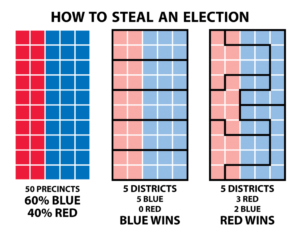
How To Steal An Election (Source: Wikimedia Commons)
“There are so many threats to minority representation that we tend to focus on the cause of the day rather than the larger prevailing issues,” Nathaniel Persily, James B. McClatchy Professor of Law at Stanford Law School told Atlanta Black Star. Professor Persily does not believe the Whitford case will do much for voting rights. “To what extent should we be talking about voter ID and all those areas where you see barriers to representation being erected? My view is that the partisan gerrymandering cases are not where you are seeing most of the relevant action in terms of minority representation,” Persily said. “You have racial gerrymandering cases, but there is a high correlation between party and race. North Carolina, Virginia, Alabama, Texas — all of these cases bring up racial gerrymandering, but they also have a serious partisan component to them. So maybe part of the story is how party and race have become so highly correlated,” he added.
Some of the other pressing voting rights issues include the promulgation of voter ID laws that disproportionately impact low-income, Black and Brown, elderly and disabled Americans; President Trump’s voter integrity commission, which critics say could have a chilling effect on voting rights, and the unlimited corporate funding of elections through the Supreme Court decision in Citizens United v. FEC.
“Then there is campaign finance. The issues of big money and elections have been submerged as a result of 2016,” Persily noted. “The story of the Trump campaign success is social media and coverage by legacy media. A lot of people are now thinking about how social media has changed how people are making decisions.” Reports that Russians bought 3,000 Facebook ads to influence millions of voters — including key states such as Michigan and Wisconsin — and hacked the voting systems of 21 states further complicates an already murky American electoral landscape.
“The long and short of it is returning power to the people is something everyone has admonished in American politics,” Persily added. “Democrats and Republicans want different things.“
What are the solutions? Donita Judge calls for increased civic engagement on the local level, including attending public hearings. “In our communities, redistricting occurs on every level of government. City council, school boards, county commissioner, those races impact us every day,” she said.
“It’s also engaging people and not just engaging people during the election season,” she added, noting the need to teach civic engagement in school and start early at the high school level, at pre-voting age. For example, the North Carolina legislature repealed a measure that allowed 16- and 17-year olds preregister to vote, which encouraged more voters to participate in the political process. A federal appeals court overturned the state ban on preregistration.
Meanwhile, some states such as Illinois are passing legislation for automatic voter registration, potentially adding 1 million new voters to the state’s rolls when they visit the Department of Motor Vehicles or certain other state agencies. Judge says such a measure is helpful, but if limited to the DMV it does not help the many Black people who do not possess driver’s licenses. Further, we must keep our eyes on the impact of mass incarceration on voting rights, and the purging of inactive voters in states such as Ohio, which the Trump Justice Department supports, in a case to be heard by the nation’s high court.
Then there is the matter of energizing voters to exercise their right. “Getting on the rolls and getting out to vote is the million dollar question,” Judge said. “What gets people out to vote if it’s not President Obama?”
